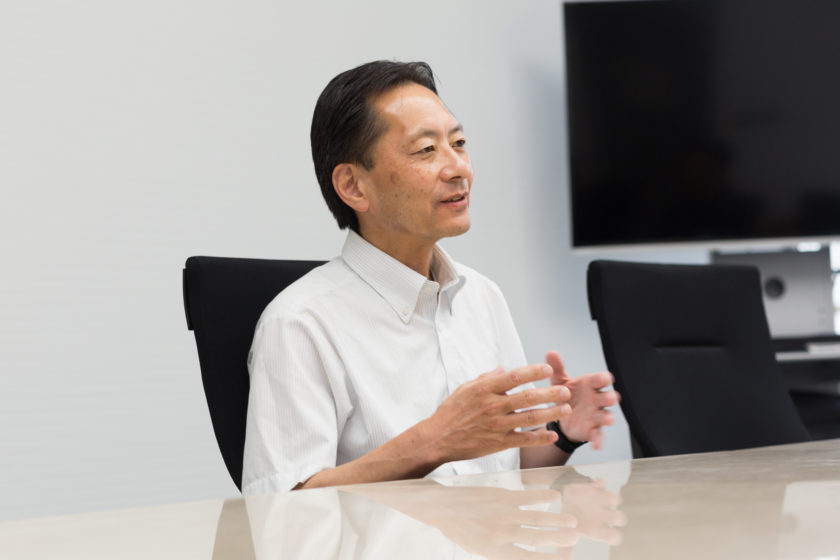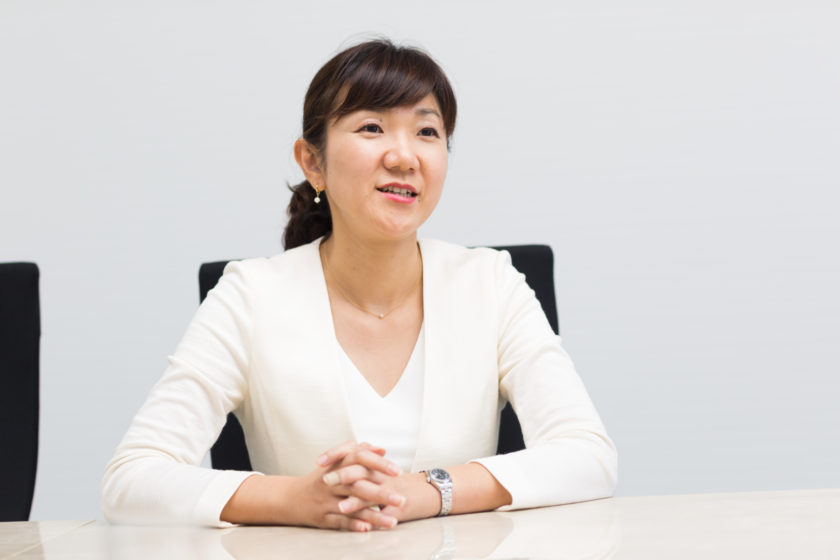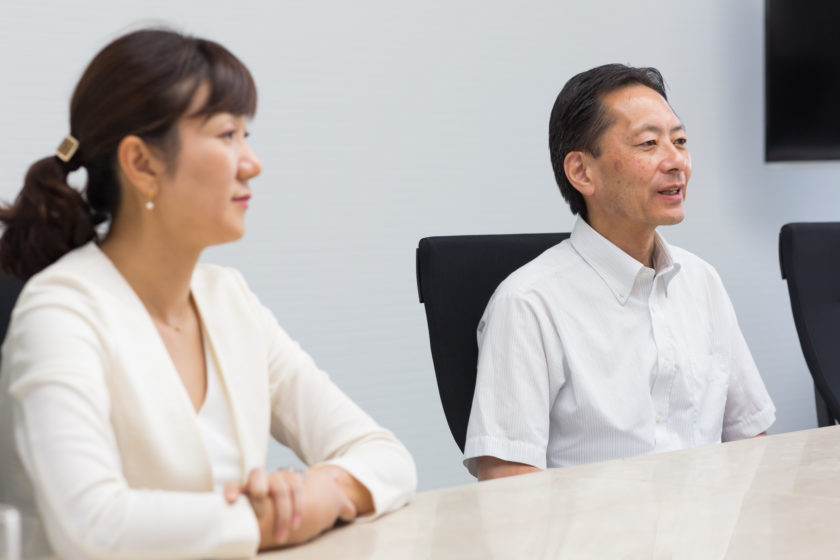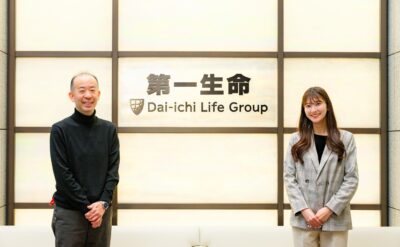
Clients' Voice
A nine-month training programme transforms new employees into first-class businesspeople.
NGK Insulators, Ltd.
Since 2011
Senior Staff Member Human Resource Development
Naoki Yazaki (left) / Mayumi Okuno (right)
Issues
Graduates already skilled in English needed better skills in business communication.
Several of the new hires coming into our company were already proficient at English. The next step, was to develop their business English communication skills to help them succeed on a global level.
After training:
We gained a pool of new employees with a greatly expanded awareness.
The new employees developed mindsets vital for their business and acquired improved continuous study habits that polished their skills.
Gaining more proficiency in English and practical communication skills.
Q: When did you start working with Canning?
Yazaki: We started working with Canning in 2011. We were searching for new ways to ready our employees for high-performing careers at a global level. The solution we found was the “Global Seminars for New Employees.”
Canning’s “Practical Level” training programme for small groups is one such seminar. Out of the almost 100 new employees we hire each year, we only put the top-6 into this programme.
Okuno: Though already proficient in English, the students taking the programme need to fill the gaps in their knowledge before they can communicate like businesspeople at an international level. Through this training they gain practical skills by learning business-appropriate language, persuasion skills, and negotiation techniques. They also acquire more advanced writing and presentation skills to prepare them for effective, confident professional careers in other countries.
Yazaki: The programme requires participants to proactively think of what to say,to shape their statements in English. Even the best English-speakers are exhausted by the end of the day. By repeating the same process once monthly for nine months, the participants finish the programme with the fluency they need to interact with business partners overseas.

The long-term format encourages participants to cultivate their self-study skills.
Q: Why is the programme structured as a nine-month programme with once-monthly sessions?
Yazaki: The long-term format of this programme allows participants to apply what they learn in the training to their everyday business routines and then to provide feedback for use in the next training sessions. The repetition of this cycle for many months reinforces the course material that the participants study. The lessons they learn are more likely to likely to stick.
Working consciously with English over extended periods also helps them develop the precious habit of studying on their own. The participants must complete assignments between the training sessions. Many of them choose to study other topics independently, as well. Month by month, the training sessions give them the opportunity to show the progress they have made. When the consultants and fellow participants see and respond to one’s success, the motivation for further study grows.
Okuno: Finding ways to keep motivation high is essential for a long-term training programme such as this. When we expressed this thought to Canning, they suggested that we schedule fun English-themed events such as English-only lunches and coffee breaks during the sessions. The events we planned have been very effective in generating enthusiasm to learn more. Canning’s helpful suggestion was key to our success in structuring a training programme that was both intensive and engaging.
A mindset essential for global business.
Q: How had the participants changed by the end of the training?
Yazaki: They came out of the training with new mindsets and perspectives on global business. When they started the training, some of the participants were hesitant to speak up and use their advanced English skills. People who stay quiet don’t get very far when doing business.
Our solution to bring the quieter participants out from their shells was simple. We designed role-playing activities that got the participants into the habit of constantly asking themselves, “How can I contribute this situation?” By reinforcing their drive to contribute, the training will help the participants advance further in international business.
Okuno: Some of the programme participants were actually assigned to handle international business before completing the training programme. Others were put in charge of international group company employees and international clients during the programme. A good many of the participants were also sent overseas on business trips a year after training. I hope the graduates of this programme can shine by putting the lessons they learned to use.

The participants are immensely satisfied with the high quality of the consultants.
Q: How satisfied are the participants with the training overall?
Okuno: Once the training is over, we ask participants to rate their satisfaction with the programme on a scale of 1 to 5. The average satisfaction rating for this practical programme has risen every year. The rating for this year’s sessions reached 4.7. Among the programme components, the most highly praised has been the quality of the consultants. I credit this result to the first-class business backgrounds of the consultants at Canning. The persuasive advice they offer on business scenarios is based on their real-life experiences.
Yazaki: We in management are also delighted with the quality of the consultants. We especially appreciate their flexibility. The consultants clearly assess the strengths, weaknesses, and other traits of the participants in order to tailor their guidance individually. Through this approach, different trainers can bring about significant differences in the results of the training even when the study materials are the same.
Q: What do you expect from Canning in the future?
Yazaki: I hope they will maintain the present quality of consultants. I would also like them to continue customizing the programme in fine detail based on feedback from the participants.
Okuno: As our social concept of an ideal school education changes in coming years, the skillsets and attitudes of our freshman employees are likely to change, as well. Both the structure of the global business environment and the trends in study curriculums are being rapidly reshaped. We hope to work in tandem with Canning to develop training programmes that anticipate and meet the needs of the near future.

All of the “Clients' Voice” interviews
-


The Dai-ichi Life Insurance Company, Limited
"The assessment has undoubtedly become a key tool in supporting the growth of young employees."
Read more
"With the Saville Assessment, we can better understand each employee’s unique qualities and build stronger teams."
In this interview, we explore how these insights—enhanced through customized assessments and seminars—have transformed 1-on-1 meetings into actionable growth strategies.
-


NetSTAR, Inc.
“The training content is flexibly customized according to each participant’s challenging area. ”The content of the training matched my actual business reality. “Acquiring better English skills has given me the momentum to improve not only my own skills but that of my team
Read more
We spoke to a participant who continues the Canning 1to1 Business English Skills training more than 3 years. The participant shared positive feedback about her experience with Canning 1to1 training.
-


NetSTAR, Inc.
-“There was also a positive impact on sales.”
Read more
-“As the number of members who could speak English increased, the management was able to focus more on its core work.”
-“Ms. Sugawara learned English at a level that can be described as "work-ready"
We asked the participants’ manager to share his thoughts on our training programs and their effects on their business.
We will be happy to listen to your requests and propose a solution suited to your needs.



